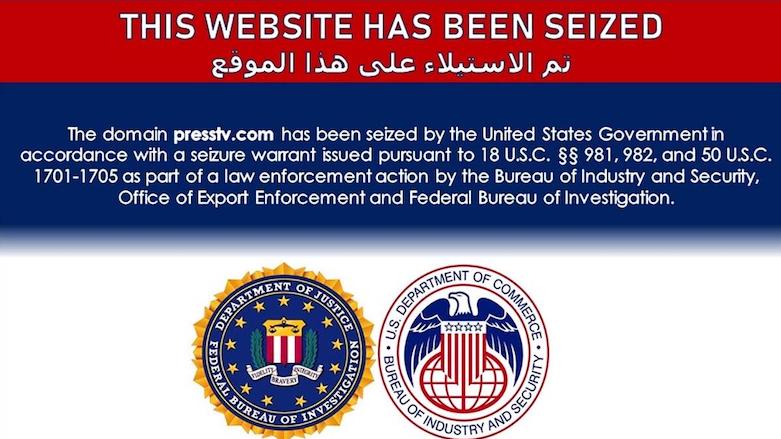US seizes Iranian, Iraqi militia websites, as hardliner elected Iranian president and nuclear talks stall

WASHINGTON, DC (Kurdistan 24) – The US has seized websites used by Iranian media, as well as sites belonging to the Iraqi militia Kataib Hizbollah, the Department of Justice announced on Tuesday.
The formal reason for the seizure was sanctions violations. All 36 websites were owned by a US company.
Last October, the US Treasury Department designated Iran’s Islamic Radio and Television Union (IRTVU) as a terrorist entity because it was controlled by the Quds Force of the Islamic Revolutionary Guard Corps (IRGC), which the US had designated as a terrorist organization.
Washington charged that IRTVU, along with the IRGC and the Quds Force, were attempting to influence the outcome of the US presidential elections, by “spreading disinformation online and executing malign influence operations aimed at misleading US voters.”
Kataib Hizbollah, an Iraqi militia backed by Iran was designated a terrorist organization in 2009. Its head, Abu Mahdi al-Muhandis, who was also deputy chief of Iraq’s Popular Mobilization Forces, was killed in January 2020 in a US strike that targeted the head of the IRGC Quds Force, Qasim Soleimani, as he arrived in Baghdad from Damascus.
Both the IRTVU and Kataib Hizbollah, as designated terrorist entities, were required by US law to obtain Treasury Department permission to engage in business with a US company.
Designated entities “are prohibited from obtaining services, including website and domain services, in the United States without an OFAC [Office of Foreign Assets Control] license,” the Justice Department said.
Tuesday’s move marked the first time the Biden administration has adopted serious measures against the Iranian regime. Critics charged that it was focused too narrowly on returning to the 2015 Iranian nuclear accord, formally known as the Joint Comprehensive Plan of Action (JCPOA), while it neglected other issues, apparently believing that keeping silent would facilitate the talks.
Read More: US reiterates commitment to securing Iran nuclear deal, despite Raisi’s poor human rights record
Raisi’s Hard Line
On Monday, Ebrahim Raisi, Iran’s next president, called on the US “to remove all sanctions” and “return [to the JCPOA] and fulfill your obligations.”
The Biden administration has outlined a plan to restore the JCPOA and then negotiate a second, follow-on agreement to address other issues, including Iran’s missile program; its support for regional proxies; and its support for terrorism.
There are a multiplicity of sanctions on Iran, some related to Iran’s nuclear program, some to other issues. Critics have asked, if sanctions are eased sufficiently enough to cause Iran to return to the JCPOA, what leverage would remain to make Iran accept a second agreement?
And if substantial sanctions remain on Iran, sufficient to provide the leverage to negotiate a second agreement, why should Iran return to the JCPOA?
Read More: Senior US Senators, on bipartisan basis, criticize Biden administration over Iran nuclear deal
The administration has yet to explain how it expects to deal with that dilemma.
Indeed, even as Raisi demanded that the US lift all sanctions as part of restoring the JCPOA, he rejected a follow-on deal along the lines suggested by the Biden administration.
“Issues related to regional [influence] and missile program are not open to negotiation,” Raisi affirmed.
Renewed Doubts about JCPOA
The Biden administration maintained that Raisi’s election would not change the dynamic in the nuclear talks, as Iran’s Supreme Leader Ali Khamenei approved all major decisions.
However, early comments by Raisi have raised doubts about that conclusion.
“Optimism that a [nuclear] deal was imminent has faded,” the Associated Press reported on Tuesday, “as the latest talks [in Vienna] ended Sunday without tangible indications of significant progress,” while Iran’s incoming president on Monday “rejected a key Biden goal of expanding on the nuclear deal.”
Until recently, Israeli officials had expected that the JCPOA would be restored. However, like the Associated Press, they are no longer confident of that.
“Israel is having trouble figuring out whether Iran is close to signing a nuclear deal,” the Israeli newspaper Haaretz reported on Tuesday, as it offered three possible scenarios.
One is that Iran really does want to reach a deal over the JCPOA, but intends to wait until Raisi takes office. A second scenario is that Iran is no longer interested in such a deal and will make radical new demands that will cause the talks to collapse. And the third scenario is that Iran has been engaged in deception, dragging out the negotiations to give it as much time as possible to make advances in its nuclear program.
Monitoring of Iran’s nuclear program by the International Atomic Energy Agency (IAEA) is ongoing, although Tehran has imposed significant limits on it.
Read More: US supports IAEA compromise on Iran nuclear inspections
The IAEA’s agreement with Tehran to continue its monitoring expires on Thursday. The agreement is supposed to be renewed, but the head of the IAEA, Rafael Grossi, has warned that Iran was raising problems.
“I think it’s becoming increasingly difficult,” Grossi said.